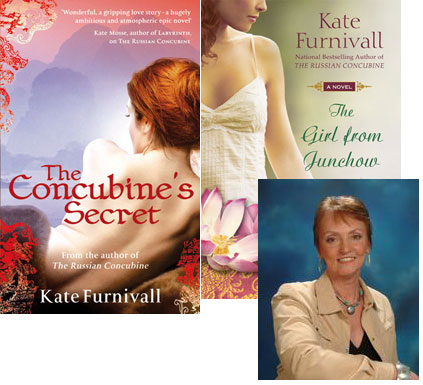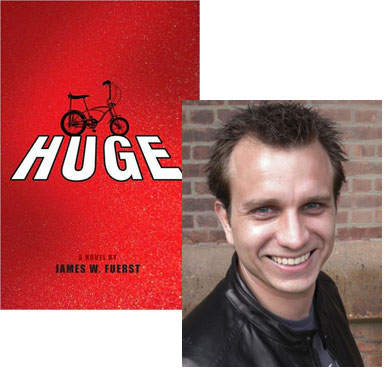Kate Furnivall: What’s in a Name?

Nearly a year ago, I published a guest essay from Kate Furnivall about addressing her uncovered Russian ancestry through fiction. This summer, she returns to the world of The Russian Concubine with a new novel called The Girl from Junchow… except in the United Kingdom, where it’s known as The Concubine’s Secret. As the possibility of a new guest essay emerged, I found myself wondering about those two titles—so I asked if she’d be willing to explain how they came about.
Titles are magic keys. They open the door to a book. They are designed to give a sense of what lies between the covers but in such an intriguing way that they tempt the reader to pick the book off the shelf in the bookstore.
Question: What makes a good title? Answer: One that sells books.
This is the holy grail of both novelists and publishers. Ideally, any writer will tell you, it is preferable to have settled on a title before even starting to put pen to paper because it means you have worked out exactly what lies at the heart of your book, what your focus is as its author. It means that every day when you open up the file on your computer, it is there in front of you in large letters—the title of the book. Reminding you what it is about.
Wouldn’t it be nice to live in such an ideal world? But sadly we don’t. So titles do not always slot into the brain as conveniently as authors would wish. Think about the titles that have attracted acclaim. There are some great ones out there—For Whom The Bell Tolls and Gone With The Wind. And more recently of course the supremely simple The Da Vinci Code. I’d really like to know how convoluted was the process by which those titles were chosen.
An author can spend months trying to drum up the right title. I know. I’ve done it. As the days and months tick by while you’re writing the book, endless wakeful hours in bed are spent with your mind churning, trying out every different combination of words. Whether you’re mowing the lawn, cleaning your teeth or feeding the cat, your mind keeps tugging at the knotty problem. It can end up driving you mad. And that’s when—if you’ve any sense—you rope in your publisher and agent to help.
30 June 2009 | guest authors |
James W. Fuerst And His Huge Surprises

Full disclosure: Soon after I started reading an advance copy of James W. Fuerst’s debut novel, Huge, earlier this year, I immediately glommed onto the idea of getting him to come in for the reading series I’ve been curating and do a theme night devoted to literary novels with adolescent protagonists. That idea didn’t pan out (although the event I wound up producing was a success), but I’m still interested in seeing what other readers will make of Fuerst… and when the opportunity to learn more about how Huge came into being presented itself, I didn’t hesitate.
When I first got the idea for Huge, I’d been living in London for about seven months or so and had experienced a couple of surprises. Before my wife and I had even arrived there, I’d landed an interview for a teaching position at a university in London, and we took up residence in the U.K. with a good deal of anticipation. That I didn’t get the position wasn’t the surprise—the academic job market is like playing basketball against a much taller person; rejection is a big part of the game—but that none of the many CV’s, resumes, and applications I sent out from that point forward resulted in anything at all, not even so much as an e-mail confirming receipt, well, that was surprising. I’d never earned much money in the various jobs I’d held over the years, but I’d never been unemployed or without prospects, either, so the experience was kind of new to me.
But I was in luck. My wife’s job kept us from being homeless and starving on the streets of a foreign country, I’d already begun working on a novel, and I now had time to devote to it, or at least a bit of time until something else panned out. So, I wrote; I wrote a lot, actually, ten to twelve hours a day, six days a week. It did not go well. After a few months, it began to dawn on me that my first attempt at a novel was turning into a monstrosity, an unsalvageable mess; it was ponderous, convoluted, plodding, and dull, and, worst of all, it was supposed to be a comedy. Why I’d expected anything else is really anyone’s guess, but I have to admit that I had the gall to be surprised.
I decided to take a short break from the first project—which, like Huge, I’d intended to be a kind of detective story with humorous elements—to try to write something that was actually funny. I cheated a little by reading some novels in Terry Pratchett’s Discworld and Gregory McDonald’s Fletch series, among others, and then by giggling my way through an anthology of short stories edited by Maxim Jakubowski called The Mammoth Book of Comic Crime. There are a number of gems in that collection, but Mat Coward’s “And the Buttocks Gleamed by Night,” about a hard-boiled cat detective, had me laughing for days.
29 June 2009 | guest authors |

 Our Endless and Proper Work is my new book with Belt Publishing about starting (and sticking to) a productive writing practice.
Our Endless and Proper Work is my new book with Belt Publishing about starting (and sticking to) a productive writing practice. 
